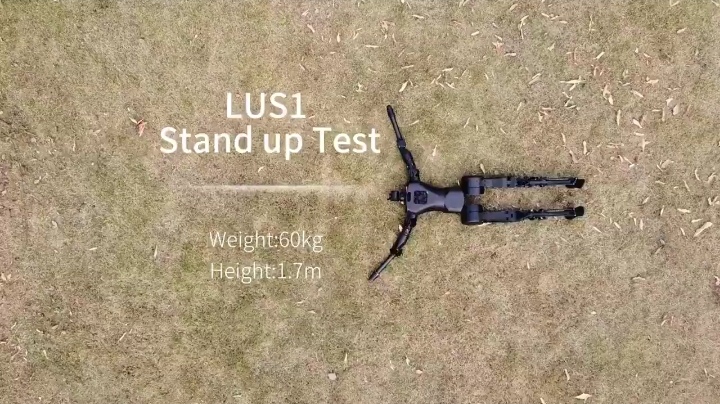LUS1: The Resilient Humanoid by Lumos Robotics
Lumos Robotics has unveiled their latest humanoid robot, LUS1, a cutting-edge innovation designed to handle dynamic and challenging environments. Standing at an impressive 1.7 meters tall and weighing 60 kilograms, LUS1 has been engineered with advanced movement capabilities, enabling it to navigate uphill and downhill terrains with ease. The robot’s standout feature is its robust balance and recovery system, allowing it to withstand falls and recover seamlessly, showcasing remarkable stability. LUS1 has been tested rigorously in various scenarios, including navigating obstacles and maintaining functionality in real-world conditions, which makes it a promising contender for dynamic applications.

LUS1 also demonstrated its resilience in handling external forces during field tests, where it maintained stability despite deliberate impacts. This feature highlights its potential for scenarios involving unpredictable interactions, such as with humans or animals in crowded or hazardous areas. With ongoing prototype testing, LUS1 is shaping up to be a versatile humanoid robot capable of thriving in environments that demand adaptability and durability. For a closer look at this innovation, you can view its latest test runs on platforms like YouTube and Facebook, where its performance has already started gaining attention.
Sam Altman Announces o3-mini for Free ChatGPT Users
Sam Altman, CEO of OpenAI, has revealed exciting news for free-tier ChatGPT users: they will soon gain access to the advanced o3-mini reasoning model. Announced on January 23, 2025, the update promises to enhance the reasoning capabilities of free-tier accounts, bringing more advanced AI features to a broader audience. Altman also emphasized that ChatGPT Plus subscribers will benefit from extensive o3-mini usage, solidifying the model’s availability across multiple tiers. This announcement has sparked anticipation as users await the roll-out of this innovative model.

The o3-mini model is part of OpenAI’s efforts to make advanced AI accessible to users at various levels. OpenAI recently finalized the o3-mini model, which boasts improved reasoning and decision-making capabilities, and plans to release it within weeks. Alongside integration into ChatGPT, the model will also be available via an API, further expanding its usability for developers and businesses. This marks another step forward in democratizing cutting-edge AI technology for the public, with excitement building as the official release date approaches.
XPENG Motors Unveils Advanced Humanoid Robot ‘Iron’
XPENG Motors recently revealed their humanoid robot, Iron, during their annual meeting, marking a significant milestone in their robotics development. Standing 1.72 meters tall and weighing 70 kilograms, Iron boasts over 60 joints and 200 degrees of freedom, allowing it to perform intricate, human-like movements. Powered by XPENG’s proprietary Turing AI chip, which also supports the company’s autonomous driving systems, Iron has been developed over five years and is currently being deployed on production lines. The robot is already assisting in assembling components, including tasks related to the manufacturing of XPENG’s new P7+ electric vehicles.

Looking ahead, XPENG envisions Iron moving beyond manufacturing roles to play a part in retail and personal assistance within homes and offices. This innovative leap positions XPENG as a key player in the burgeoning humanoid robotics field, alongside competitors like Tesla. Iron’s advanced dexterity and adaptability are setting the stage for its potential use in diverse environments, showcasing XPENG’s dedication to integrating robotics with cutting-edge AI. With the reveal of Iron, XPENG highlights its ambition to revolutionize both automotive and robotic industries.
OpenAI Launches Operator: An AI Agent for Everyday Tasks
OpenAI has introduced “Operator,” a groundbreaking AI agent designed to autonomously perform web-based tasks on behalf of users. Powered by the new Computer-Using Agent (CUA) model, Operator integrates GPT-4o’s advanced vision capabilities with enhanced reasoning, enabling it to simulate clicks, typing, and scrolling on web pages. This allows Operator to complete a wide range of activities, such as filling out forms, booking travel arrangements, and even ordering groceries. OpenAI has partnered with companies like Instacart, Uber, and eBay to streamline these services, ensuring broad functionality for users.

Currently available as a research preview for ChatGPT Pro subscribers in the U.S., Operator emphasizes user security by requiring manual input for sensitive actions like entering payment details or logging into accounts. OpenAI plans to refine the AI agent based on user feedback, with plans to expand its availability in the future. This innovation highlights OpenAI’s ongoing efforts to bridge the gap between AI and practical, everyday applications, showcasing the potential of AI to simplify complex tasks and enhance user convenience.
DeepSeek-R1: Redefining AI Reasoning with Open-Source Innovation
On January 22, 2025, Chinese AI startup DeepSeek introduced its latest model, DeepSeek-R1, which has made headlines for its exceptional reasoning and computational abilities. The model achieved a remarkable 79.8% success rate on the AIME 2024 mathematics benchmark, surpassing OpenAI’s o1 reasoning model. Additionally, DeepSeek-R1 demonstrated expert-level coding proficiency, attaining a 2,029 Elo rating on Codeforces, outperforming 96.3% of human participants. These results position DeepSeek-R1 as a leading contender in the global AI landscape, particularly in reasoning and programming tasks.

A notable feature of DeepSeek-R1 is its affordability. At just $0.14 per million tokens, it is approximately 98% cheaper than OpenAI’s comparable offerings, which cost $7.50 per million tokens. Released under the MIT license on January 23, 2025, DeepSeek-R1 is fully open-source, allowing free use for commercial and academic purposes. This contrasts with OpenAI’s subscription-based models and underscores DeepSeek’s commitment to accessible AI innovation. Industry leaders, including Nvidia’s Dr. Jim Fan, have praised the release as a milestone in open-source AI, with Fan stating that DeepSeek “keeps the original mission of OpenAI alive—truly open frontier research that empowers all.
